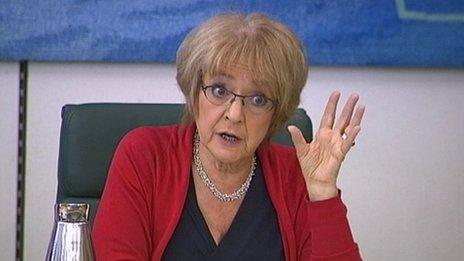Treasury anger over Margaret Hodge 'grandstanding'
- Published
- comments

There is anger within the Treasury that what they see as grandstanding by a senior Labour MP is putting off big businesses from relocating to the UK.
The work of Margaret Hodge's Public Accounts Committee - which scrutinises spending - is "having an impact" on foreign investment, sources claim.
Mrs Hodge, who has chaired the committee since 2010, described the criticism as "completely fallacious."
She also said officials should "have the guts" to make comments to her face.
The MP grabbed headlines last year when she branded Google's tax record "evil".
Treasury sources say senior ministers have been warned by businesses that the prospect of public humiliation in front of MPs and the television cameras makes them think twice about where to invest.
Boycott
"Companies looking at Britain are being put off the idea of moving their headquarters here because they fear the level of public exposure for behaving perfectly legally.
"There is no doubt it is having an impact. We are trying to show we have one of the most competitive corporate tax regimes in the world, but the message is being sent out if you come here you will be exposed to this sort of criticism from Margaret Hodge and her committee.
"The head of a company looking to move here would see the way other people have been hauled in front of MPs and subjected to criticism and will think: 'I'm not doing that.'
"The likes of Starbucks and Amazon will always be here, but other companies looking at Britain are being put off the idea of moving their headquarters here."
The government believes it faces a tricky balancing act between offering a competitive tax regime which draws international firms in, while also being seen to take action against companies which do not pay what they owe.
Last year Margaret Hodge led the questioning of executives from Starbucks, Google and Amazon over tax avoidance and said at the time that she thought it was right for customers to boycott the three companies. Clips of the session were picked up by foreign media and circulated on YouTube.
'Damaging impact'
Reacting to criticism from inside the Treasury about the work of her committee and the confrontational nature of the public hearings it holds, Mrs Hodge told me that companies looking to relocate looked at a range of factors, of which tax was just one.
"The skills of the workforce, the timezone we're in and the quality of the public services they would rely on are just as important," the Labour MP told me, "and those public services need to be paid for.
"To assume you can entice companies purely by a race to the bottom on tax is mistaken," she added, saying it was "unfair on British firms with British workers" if multinationals could "get away with paying less tax than they do."
Since the coalition came to power, ministers have emphasised their desire to ensure that drumming up business for the UK is a priority of foreign policy.
In July 2010, two months after becoming prime minister, David Cameron said: "I want to refashion British foreign policy, the Foreign Office, to make us much more focused on the commercial aspects, making sure we are demonstrating Britain is open for business. I think it is a big opportunity. As we come out of recession and into recovery we have got to pay our way in the world and I want to reorientate the Foreign Office to be much more commercially minded."
But there is growing frustration in government that public grillings of senior business leaders, often widely publicised abroad, are posing a problem.
In a speech in November, the Treasury Minister David Gauke said: "When legitimate and legal tax behaviour is wrongly presented to the public as illegitimate, or illegal; it can have a very damaging impact.
"'What's the problem?' Some people might ask. 'Surely it keeps individuals and companies on their toes? If they know they'll be under this scrutiny, surely they're less likely to do anything suspect?' But what we have to remember is this.
"If companies are worried that their reputations will be unfairly damaged. That perfectly legal and perfectly legitimate behaviour might be presented to the public as something different. Then it is quite understandable that this could put them off moving here, or investing here, or creating jobs here."
Mrs Hodge told the BBC: "I'm perfectly happy to have a public debate about the issue of who should pay tax, but I'm not prepared to do it on the back of anonymous Treasury sources."
She added: "Whoever has been saying that in the Treasury ought to have the guts to come forward."
- Published21 January 2014
- Published16 May 2013
- Published21 May 2013